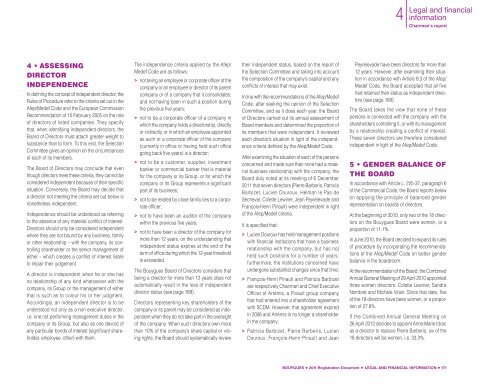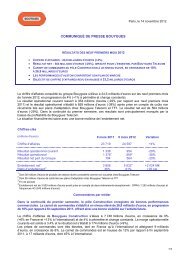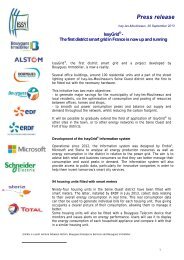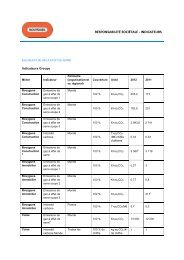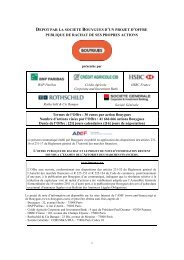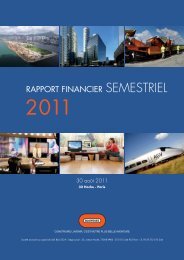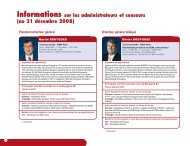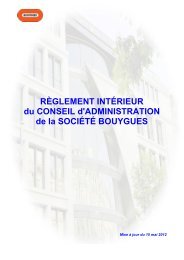Registration Document BOUYGUES
Registration Document BOUYGUES
Registration Document BOUYGUES
Create successful ePaper yourself
Turn your PDF publications into a flip-book with our unique Google optimized e-Paper software.
4<br />
Legal and financial<br />
information<br />
Chairman's report<br />
4 • ASSESSING<br />
DIRECTOR<br />
INDEPENDENCE<br />
In defining the concept of independent director, the<br />
Rules of Procedure refer to the criteria set out in the<br />
Afep/Medef Code and the European Commission<br />
Recommendation of 15 February 2005 on the role<br />
of directors of listed companies. They specify<br />
that, when identifying independent directors, the<br />
Board of Directors must attach greater weight to<br />
substance than to form. To this end, the Selection<br />
Committee gives an opinion on the circumstances<br />
of each of its members.<br />
The Board of Directors may conclude that even<br />
though directors meet these criteria, they cannot be<br />
considered independent because of their specific<br />
situation. Conversely, the Board may decide that<br />
a director not meeting the criteria set out below is<br />
nonetheless independent.<br />
Independence should be understood as referring<br />
to the absence of any material conflict of interest.<br />
Directors should only be considered independent<br />
where they are not bound by any business, family<br />
or other relationship – with the company, its controlling<br />
shareholder or the senior management of<br />
either – which creates a conflict of interest liable<br />
to impair their judgement.<br />
A director is independent when he or she has<br />
no relationship of any kind whatsoever with the<br />
company, its Group or the management of either<br />
that is such as to colour his or her judgment.<br />
Accordingly, an independent director is to be<br />
understood not only as a non executive director,<br />
i.e. one not performing management duties in the<br />
company or its Group, but also as one devoid of<br />
any particular bonds of interest (significant shareholder,<br />
employee, other) with them.<br />
The independence criteria applied by the Afep/<br />
Medef Code are as follows:<br />
> not being an employee or corporate officer of the<br />
company or an employee or director of its parent<br />
company or of a company that it consolidates;<br />
and not having been in such a position during<br />
the previous five years;<br />
> not to be a corporate officer of a company in<br />
which the company holds a directorship, directly<br />
or indirectly, or in which an employee appointed<br />
as such or a corporate officer of the company<br />
(currently in office or having held such office<br />
going back five years) is a director;<br />
> not to be a customer, supplier, investment<br />
banker or commercial banker that is material<br />
for the company or its Group, or for which the<br />
company or its Group represents a significant<br />
part of its business;<br />
> not to be related by close family ties to a corporate<br />
officer;<br />
> not to have been an auditor of the company<br />
within the previous five years;<br />
> not to have been a director of the company for<br />
more than 12 years, on the understanding that<br />
independent status expires at the end of the<br />
term of office during which the 12-year threshold<br />
is exceeded.<br />
The Bouygues Board of Directors considers that<br />
being a director for more than 12 years does not<br />
automatically result in the loss of independent<br />
director status (see page 169).<br />
Directors representing key shareholders of the<br />
company or its parent may be considered as independent<br />
when they do not take part in the oversight<br />
of the company. When such directors own more<br />
than 10% of the company’s share capital or voting<br />
rights, the Board should systematically review<br />
their independent status, based on the report of<br />
the Selection Committee and taking into account<br />
the composition of the company’s capital and any<br />
conflicts of interest that may exist.<br />
In line with the recommendations of the Afep/Medef<br />
Code, after seeking the opinion of the Selection<br />
Committee, and as it does each year, the Board<br />
of Directors carried out its annual assessment of<br />
Board members and determined the proportion of<br />
its members that were independent. It reviewed<br />
each director’s situation in light of the independence<br />
criteria defined by the Afep/Medef Code.<br />
After examining the situation of each of the persons<br />
concerned and made sure than none had a material<br />
business relationship with the company, the<br />
Board duly noted at its meeting of 6 December<br />
2011 that seven directors (Pierre Barberis, Patricia<br />
Barbizet, Lucien Douroux, Helman le Pas de<br />
Sécheval, Colette Lewiner, Jean Peyrelevade and<br />
François-Henri Pinault) were independent in light<br />
of the Afep/Medef criteria.<br />
It is specified that:<br />
> Lucien Douroux has held management positions<br />
with financial institutions that have a business<br />
relationship with the company, but has not<br />
held such positions for a number of years;<br />
furthermore, the institutions concerned have<br />
undergone substantial changes since that time;<br />
> François-Henri Pinault and Patricia Barbizet<br />
are respectively Chairman and Chief Executive<br />
Officer of Artémis, a Pinault group company<br />
that had entered into a shareholder agreement<br />
with SCDM. However, that agreement expired<br />
in 2006 and Artémis is no longer a shareholder<br />
in the company;<br />
> Patricia Barbizet, Pierre Barberis, Lucien<br />
Douroux, François-Henri Pinault and Jean<br />
Peyrelevade have been directors for more than<br />
12 years. However, after examining their situation<br />
in accordance with Article 8.3 of the Afep/<br />
Medef Code, the Board accepted that all five<br />
had retained their status as independent directors<br />
(see page 169).<br />
The Board takes the view that none of these<br />
persons is connected with the company, with the<br />
shareholders controlling it, or with its management<br />
by a relationship creating a conflict of interest.<br />
These seven directors are therefore considered<br />
independent in light of the Afep/Medef Code.<br />
5 • GENDER BALANCE OF<br />
THE BOARD<br />
In accordance with Article L. 225-37, paragraph 6<br />
of the Commercial Code, the Board reports below<br />
on applying the principle of balanced gender<br />
representation on boards of directors.<br />
At the beginning of 2010, only two of the 18 directors<br />
on the Bouygues Board were women, or a<br />
proportion of 11.1%.<br />
In June 2010, the Board decided to expand its rules<br />
of procedure by incorporating the recommendations<br />
of the Afep/Medef Code on better gender<br />
balance in the boardroom.<br />
At the recommendation of the Board, the Combined<br />
Annual General Meeting of 29 April 2010 appointed<br />
three women directors: Colette Lewiner, Sandra<br />
Nombret and Michèle Vilain. Since that date, five<br />
of the 18 directors have been women, or a proportion<br />
of 27.8%.<br />
If the Combined Annual General Meeting on<br />
26 April 2012 decides to appoint Anne-Marie Idrac<br />
as a director to replace Pierre Barberis, six of the<br />
18 directors will be women, i.e. 33.3%.<br />
<strong>BOUYGUES</strong> • 2011 <strong>Registration</strong> <strong>Document</strong> • LEGAL AND FINANCIAL INFORMATION • 171


